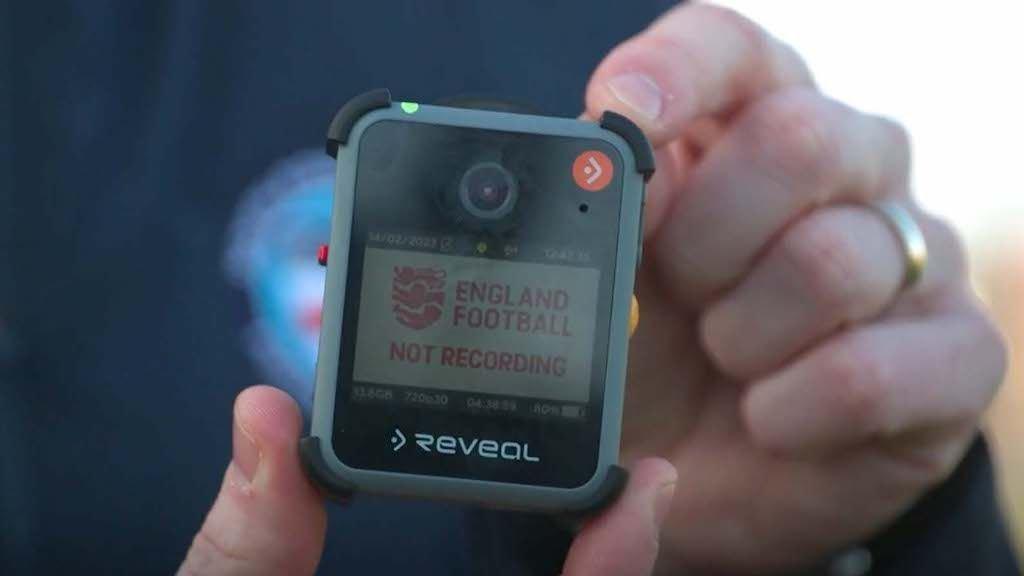Referee bodycam trial: Officials feel safer and more confident, says FA head of refereeing
- Published
How bodycams are improving attitudes towards referees
Grassroots referees feel "more confident" and "safer" wearing bodycams during matches, a Football Association trial has shown.
During the trial, launched in February, about 100 grassroots referees wore the technology during adult matches.
It comes after hundreds of grassroots referees told the BBC they feared for their safety when officiating.
The FA said the bodycams act as a "deterrent" and, to date, no referee had needed to activate their camera.
"The early signs are positive; the referees feel more confident, reassured, protected, safer," Daniel Meeson, the FA's head of refereeing, told BBC Radio 5 Live.
"Referees tell us some players have taken a second glance, seen the bodycam, and made a joke like: 'Oh I'd better not argue with you ref, I've seen the bodycam.'
"It's a positive start - no activations - so in my mind it looks like the deployment of these devices is acting ultimately in the way we want them to, which is that deterrent. Better to prevent misconduct and prevent poor participant behaviour than to have to cure it."
The FA's bodycam trial is the first of its kind in the world, and has been approved by the International Football Association Board (IFAB) - football's law-makers.
The trial is being conducted in selected adult grassroots leagues in Essex, Liverpool, Middlesbrough and Worcester.
If the trial is a success, it will be further extended during the 2023-24 season.

Footage from bodycams can be used in disciplinary hearings
How do the bodycams work?
The bodycams, produced by Reveal Media, do not record for the whole match but have an automatic 30-second capture.
This means if a referee is being abused, they can press record on the camera and it will capture the previous 30 seconds.
The footage automatically uploads to cloud storage and is subject to data protection rules. The device is encrypted, meaning the referee cannot access the footage nor can anyone else if it is stolen.
Footage captured can be used in disciplinary hearings to support the match report the referee submits to the FA, but this only applies to players or coaches who are abusive. Footage of spectators cannot be used.
If the trial is successful, the cost of the cameras will have to be addressed - according to the FA, there are about 28,000 qualified referees in England.
The FA says it does not want clubs to have to pay for the cameras and will look into funding after the trial concludes.
What did the BBC study find?
On behalf of BBC Radio 5 Live, the Referees' Association in England distributed a questionnaire to its 7,000 members.
More than 900 referees in England responded, with 293 saying they had been physically abused by spectators, players, coaches or managers.
Some described being punched, headbutted and spat at, while almost all the respondents had experienced some form of verbal abuse.
Some 57 respondents had received a death threat against them or their loved ones.
There were 122 referees aged 17 and under who responded to the questionnaire - more than 100 said they had been verbally abused by coaches/managers (105), spectators (109) or players (102).
Chris Sutton explores referee abuse in grassroots football
'Praise not pressure'
In Lancashire, the local Football Association is also trying to tackle the issue of abuse through 'Adults in Junior Football' workshops, in which they talk to parents, coaches and managers about their behaviour on match days.
Former England goalkeeper David James, who has sponsored the training of young referees in Lancashire, wants to see the workshops rolled out across the country.
The BBC was given access to a session in Preston with parents and coaches of children in under-7 to under-12 teams.
Safeguarding officer Neil Yates challenged those present at the workshop to change the "nature of the noise" to "praise, not pressure".
He told the BBC: "The biggest tragedy in this is a lot of them are kids - all we see is a black shirt, we don't see a child - and yet every week adults scream at 14-year-olds for not giving a penalty.
"To hear stories of children leaving the pitch crying because adults have screamed at them breaks my heart, but it redoubles my determination to get these messages out there."

Our coverage of your Premier League club is bigger and better than ever before - follow your team and sign up for notifications in the BBC Sport app to make sure you never miss a moment
